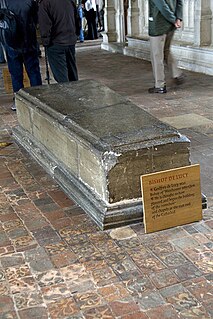Related Research Articles

Richard Poore or Poor was a medieval English bishop best known for his role in the establishment of Salisbury Cathedral and the City of Salisbury, moved from the nearby fortress of Old Sarum. He served as Bishop of Chichester, Bishop of Salisbury and Bishop of Durham.
Philip de Harcourt was a medieval Lord Chancellor of England and Bishop of Bayeux. He was unsuccessfully elected as the Bishop of Salisbury.

Josceline de Bohon or Bohun was an Anglo-Norman religious leader.

Robert de Bingham (1180–1246) was the Bishop of Salisbury from 1229 to 1246.

Walter de la Wyle was Bishop of Salisbury from 1263 to 1271, and the founder of St. Edmund's College, Salisbury.
Edmund Audley was Bishop of Rochester, Bishop of Hereford and Bishop of Salisbury.
Nicholas Bubwith (1355-1424) was a Bishop of London, Bishop of Salisbury and Bishop of Bath and Wells as well as Lord Privy Seal and Lord High Treasurer of England.
John of Oxford was a medieval Bishop of Norwich.
Henry Sandford was a medieval Bishop of Rochester.
Lawrence of St Martin was a medieval Bishop of Rochester.
Herman (died 1078) was a medieval cleric who served as the Bishop of Ramsbury and of Sherborne before and after the Norman conquest of England. In 1075, he oversaw their unification and translation to Salisbury. He died before the completion of the new cathedral.

Giles of Bridport was a medieval Bishop of Salisbury.
Robert Wickhampton was a medieval Bishop of Salisbury.
Walter Scammel was a medieval Bishop of Salisbury.
Henry Brandeston was a medieval Bishop of Salisbury.
William de la Corner was a medieval Bishop of Salisbury, who fought a long but unsuccessful battle to become Archbishop of Dublin.
Nicholas Longespee was a medieval Bishop of Salisbury.

Simon of Ghent was a medieval Bishop of Salisbury in England.

Godfrey de Luci was a medieval Bishop of Winchester.
Adelelm also known as Adelmus or Ascelinus, was Treasurer of England and nephew of Roger, Bishop of Salisbury. He was also Archdeacon of Dorset and later Dean of Lincoln. He was appointed Treasurer around 1136 and was dismissed from office in 1139. During this time he appears to have been made a prebendary of Aylesbury.
References
- British History Online Bishops of Salisbury accessed on 30 October 2007
- Fryde, E. B.; Greenway, D. E.; Porter, S.; Roy, I. (1996). Handbook of British Chronology (Third revised ed.). Cambridge: Cambridge University Press. ISBN 0-521-56350-X.